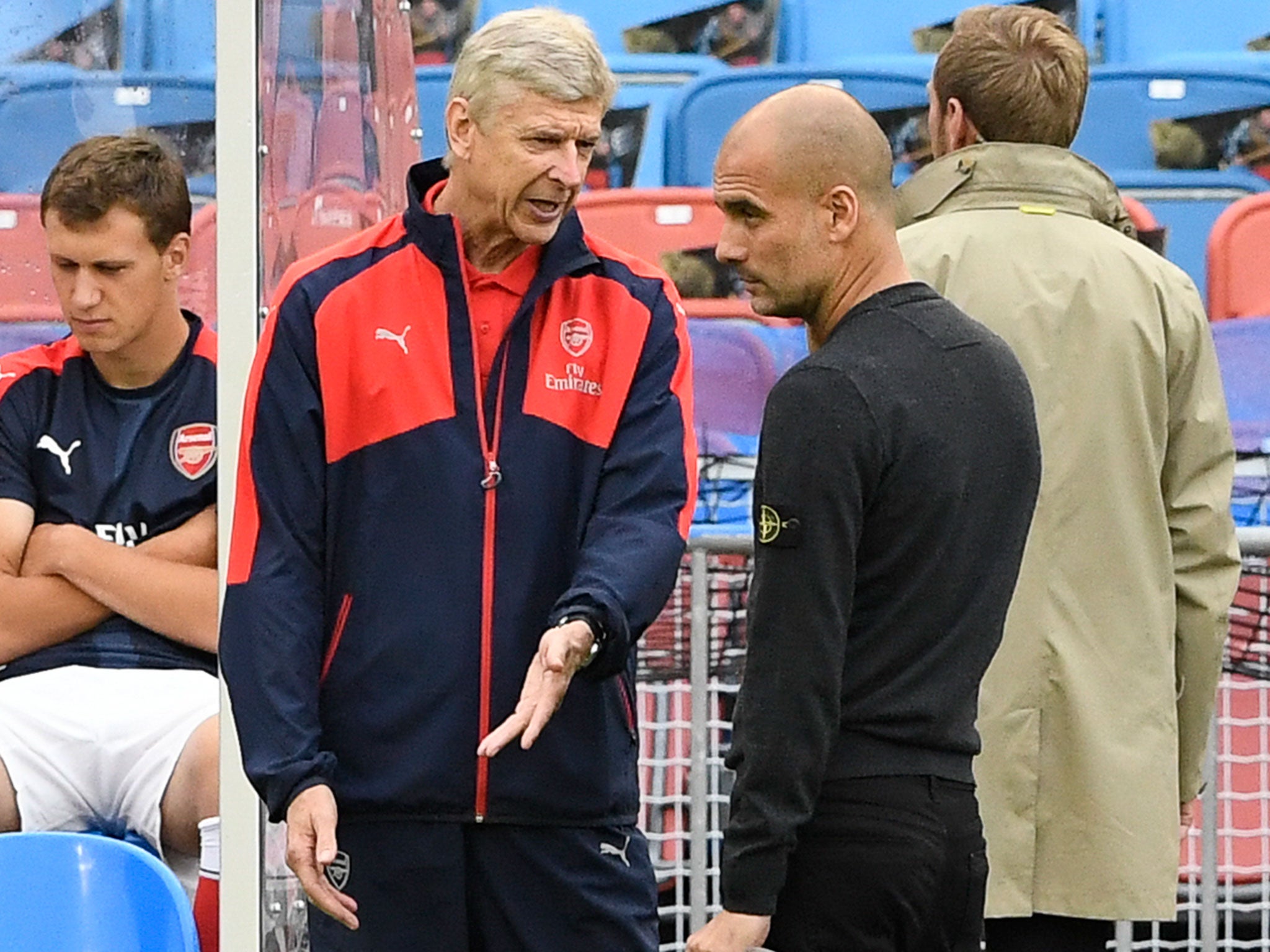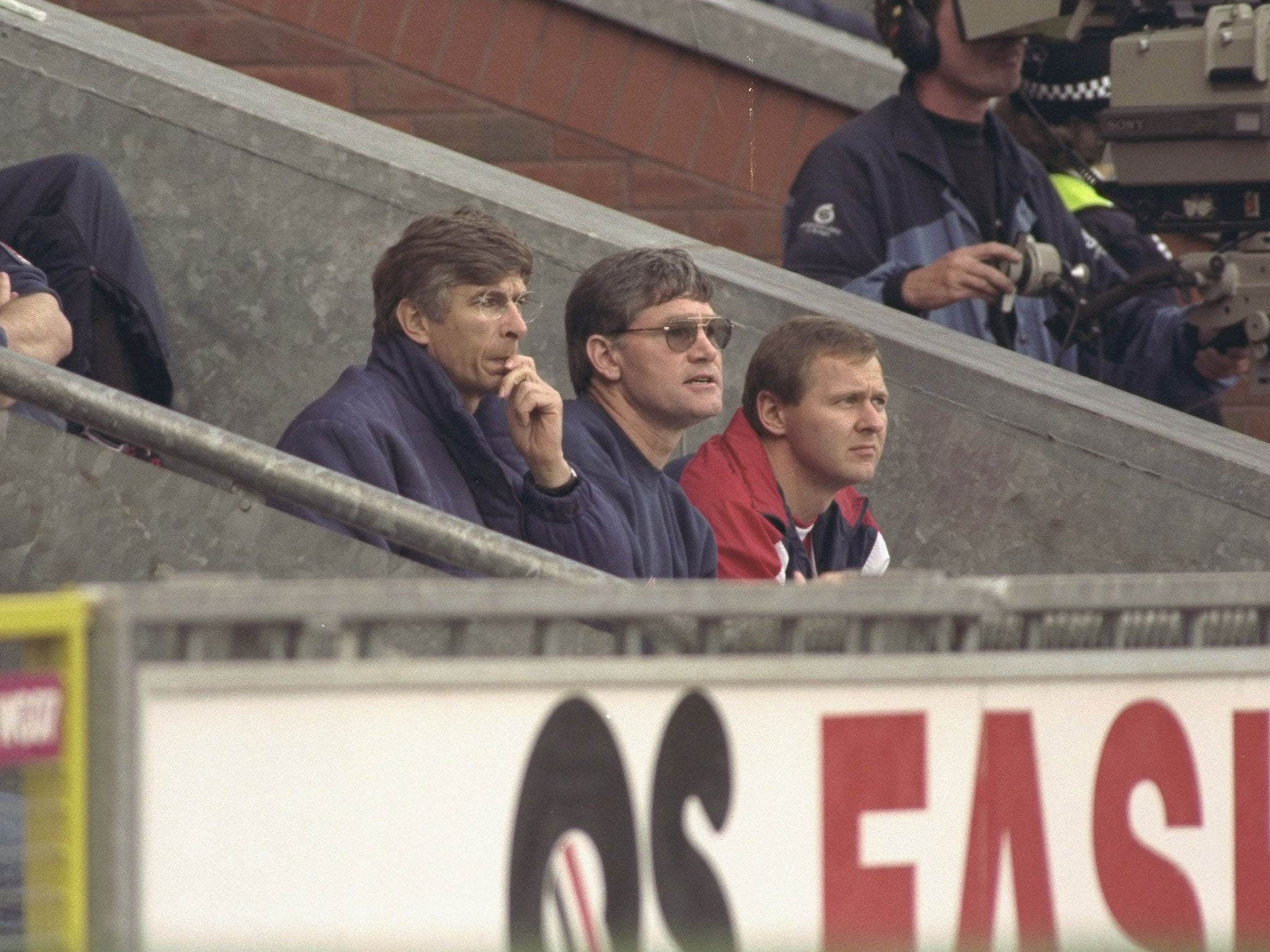Manchester City vs Arsenal: What Pep Guardiola can learn from Arsene Wenger's 20-year experience of England
Guardiola and Wenger have similar attacking philosophies, but Wenger knew how to adapt his to the realities of English football

Your support helps us to tell the story
From reproductive rights to climate change to Big Tech, The Independent is on the ground when the story is developing. Whether it's investigating the financials of Elon Musk's pro-Trump PAC or producing our latest documentary, 'The A Word', which shines a light on the American women fighting for reproductive rights, we know how important it is to parse out the facts from the messaging.
At such a critical moment in US history, we need reporters on the ground. Your donation allows us to keep sending journalists to speak to both sides of the story.
The Independent is trusted by Americans across the entire political spectrum. And unlike many other quality news outlets, we choose not to lock Americans out of our reporting and analysis with paywalls. We believe quality journalism should be available to everyone, paid for by those who can afford it.
Your support makes all the difference.Whatever issues Pep Guardiola might have with English football, he will never feel quite like Arsene Wenger did 20 years ago, greeted with the headline ‘Arsene Who?’ and so unknown in London that he could take the tube from Cockfosters to Highbury for one of his first home games.
Guardiola is a superstar of the game and he will certainly not be taking the Metrolink to the Etihad Stadium on Sunday for Manchester City's match against Arsenal.
When the two managers meet Wenger will see something of his younger self in the 45-year-old furiously trying to impose his futuristic football vision onto the English game. And Guardiola will see a man who did that so well that he has three Premier Leagues and six FA Cups to show for it. It is Wenger’s success, more than anything else, that has opened up the English game to the ideas of foreign coaches. Every foreign manager to come here since 1996, including Guardiola, is in his debt.
“I should get some newspapers from when I arrived here,” Wenger joked at his press conference on Friday morning. “You will see that it’s much easier today for the foreign managers. When I arrived, it was difficult for the foreign managers. Today it is difficult for the English managers.” There was no sense of ‘Pep Who?’ when City confirmed Guardiola’s arrival, quite the opposite.
When Wenger arrived people feared he would be the new Dr Jozef Venglos, the Czech veteran who nearly steered Aston Villa out of the top flight in 1991. The only other foreign coach in England was Ruud Gullit, who had the easy credibility of having been a top player, and in English football too. Peter Hill-Wood, Arsenal chairman, admitted that he had “cold feet” about employing a foreigner. But it was such an unusual thing to do back then that who could blame him?
City did not exactly have ‘cold feet’ about appointing Guardiola. They rebuilt the whole club so that they could. When he started in July he was paraded to fans at an event bigger than anything they have put on for a new player. “He is further [ahead] than I was 20 years ago,” Wenger admitted. “He started at Barcelona, I started at the [RC Strasbourg] academy.”
When Wenger first arrived at Arsenal, the players thought he looked like a ‘geography teacher’ with his elbow pads and large glasses. Alex Ferguson said that he was a “novice” who should “keep his opinions to Japanese football”. But all of this cultural resistance to Wenger was eroded by football’s most valuable currency, wins and trophies.
English football’s attitude to foreign coaches is to poke fun until they start winning. That is why Andre Villas-Boas’ crouch was always a story, or why Claudio Ranieri was ‘the Tinkerman’ only until he did the impossible with Leicester. Guardiola was mocked for asking ‘what is tackles’ last Saturday, after his team was shredded by Leicester City. It would barely have registered had City won. Guardiola is not facing anywhere near the same resistance Wenger faced 20 years ago. But for him to be truly embraced by English football, he will need similarly quick success.
The question, then, is whether Guardiola can do at City what Wenger did at Arsenal. Can he get his team to play his exciting expansive new style, and win in a way that no other team has won in England before?
Wenger has had his issues with City’s ‘financial doping’ in the past, but he wants Guardiola to do well: “You want every manager who has a positive philosophy to succeed.” He encouraged Guardiola to pursue his own beliefs at City. “Every manager can only act with his own personality,” he said. “He has strong beliefs, and that, for me, is the most important thing.”
But the story of Wenger’s success at Arsenal is not just one about having strong beliefs and imposing them. He did not destroy what he found and start again from scratch. Wenger improved and built on what he found.
That is why, for most of the 1996-97 season, Arsenal stuck with the back five, of Nigel Winterburn, Steve Bould, Tony Adams, Martin Keown and Lee Dixon. Wenger wanted to change to 4-4-2 but he did not do so until the summer of 1997. Everyone knows about his dietary and training changes but not everything he did was permanent. Adams, in his role as captain, told Wenger how unpopular the 8am stretching sessions were on the morning of a game. So Wenger did away with them.
By co-opting that English core at the heart of his team, Wenger gave himself a foundation to build his fast, incisive football on top of. Only after his first title win did he change the defence.
Wenger, in short, knew what to change and when. He knew that he needed to keep winning to keep earning the right to keep making changes. He could not dismantle the team on day one.

So it felt like there was a warning for Guardiola when Wenger, talking about his own experiences, said that change must be measured so that it does not leave any of the players behind. They are the ones who have to make the philosophy real on the pitch. “People are always resistant to radical change, but they are as well ready to cope with it if it is successful,” Wenger said. “Our job is to always accept that you want your own philosophy, but at the right pace.”
Wenger made his changes at the pace he thought his players could take. “When you go somewhere,” he said, “sometimes you have to analyse what is going on and to bring in your own philosophy at a pace where you think they can cope with it.”
If there is one set of questions to be asked of Guardiola at City, this is it. Is he building on what he inherited, as Wenger did at Arsenal? Or is he trying to start from scratch? Is he improving the players? Or is he imposing his philosophy at a pace which they cannot cope with?
City started this season playing brilliantly, in a simple 4-1-4-1 formation. They won their first 10 games in all competitions. But the more Guardiola has tried to complicate and innovate, with inside full-backs and his ‘3-box-3’, the worse City have played. They will likely be 10 points behind Chelsea, who play a far simpler game, at kick-off on Sunday.
No-one expects Guardiola to still be City coach in 20 years’ time, but if he is to emulate Wenger’s success, if not his longevity, he may need to know what to build on and what to burn. In football, as in life, there is no such thing as a blank slate.
Join our commenting forum
Join thought-provoking conversations, follow other Independent readers and see their replies
Comments